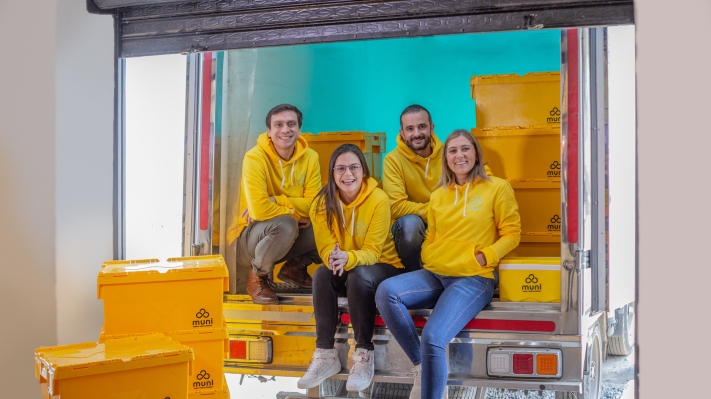We’ve been hearing the concept of “community” lately in different aspects of startups and venture capital.
From Lolita Taub taking a community-first focus in venture capitalism to Archive tapping into community for marketing buying power.
In Latin America, where being a part of a community is important, we see startups, like Trela in Brazil and Muni in Colombia, bringing people together under a common need — in Muni’s case, the purchase of everyday essentials.
María Echeverri Gomez got the idea for the company after getting her MBA at Stanford and leading the global grocery operation at Rappi.
“I was at Stanford looking at what opportunities in Latin America could accelerate the adoption of technology,” she told TC. “While I was at Rappi, I saw what could be done, but with the global pandemic proved technology in the long-term is better for everyone, but few people had access to it.”
After taking some exploratory trips to China and India, she realized that the first steps to access seemed to always be people buying things online, so she began looking at how to make e-commerce more accessible to the 92% of Latin Americans who were unable to access online shopping.
Add in the challenge of not having much trust in it: People like to touch things, receive the product in the quality they expect and often pay cash on delivery, Echeverri Gomez said. However, she saw community buying as a way to cover all of those bases while also giving people an extra income source to raise them out of poverty.
The process is fairly simple: Community leaders centralize the orders by sharing a link to the WhatsApp online store. Neighbors put in their orders and the supplier drops off the orders with Muni, which picks and packs them and leaves them with the community leader to take care of the last-mile delivery and collecting the cash payments.
“We built an app to make community leaders successful, to know their earnings, manage their customers and know who has and hasn’t ordered,” she added. “Many community leaders have never done transactions online before — we’ve even had to introduce what a shopping cart is — so the product is very intuitive.”
Muni has operations in Colombia, Mexico and Brazil, and over 15,000 community leaders utilize the service, which has grown 20% month over month since its launch in June 2020. The company offers more than 6,000 SKUs across 20 categories, from groceries to fresh produce to packaged goods to electronics. At the same time, customers — there are over 40,000 of them already — enjoy prices up to 40% lower than the competition, with no extra shipping or service fees, according to Echeverri Gomez.
Meanwhile, the company has also grown in headcount, with 500 employees — about half in warehousing and the others spread among operations, business, technology and customer service.
To continue that rapid growth, the company closed on $20 million in Series A funding in what Echeverri Gomez touts as “the largest Series A investment reported for a female founder in Spanish-speaking Latin America to date.”
Lightspeed Venture Partners led the round and was joined by Muni’s seed investors Monashees and Pear VC, as well as a group of angel investors, including Rappi co-founders Simón Borrero and Felipe Villamarin, Affirm founding COO Huey Lin, Habi co-founder Brynne McNulty Rojas, Frubana founder Fabian Gomez, Loft co-founder Florian Hagenbuch and GGV managing partner Hans Tung. The latest funding gives Muni a total funding of about $27 million.
Alex Taussig, partner at Lightspeed Venture Partners, said Muni will likely be the first digital account someone has, and what the company is doing to build profiles will make for a better shopping experience.
“We were impressed with how thoughtful Maria was and how the model was working really well and growing rapidly,” he added. “There is a real social mission component and an angle for empowering women to be entrepreneurs in their regions. She believes this will enable them to get out of poverty.”
Echeverri Gomez plans to use the new funding to invest in the technology and product teams, scale operations and ensure the right infrastructure is in place as Muni expands to second- and third-tier cities. She expects to also expand into new categories and service lines, including financial services.
“We want to be social commerce with a backbone in the supply chain,” she added. “Many of the ‘superapp’ models have only worked in China so far. In Latin America, many are taking a top-down approach, in terms of income, but we are the only ones in position for a bottoms-up approach.”










